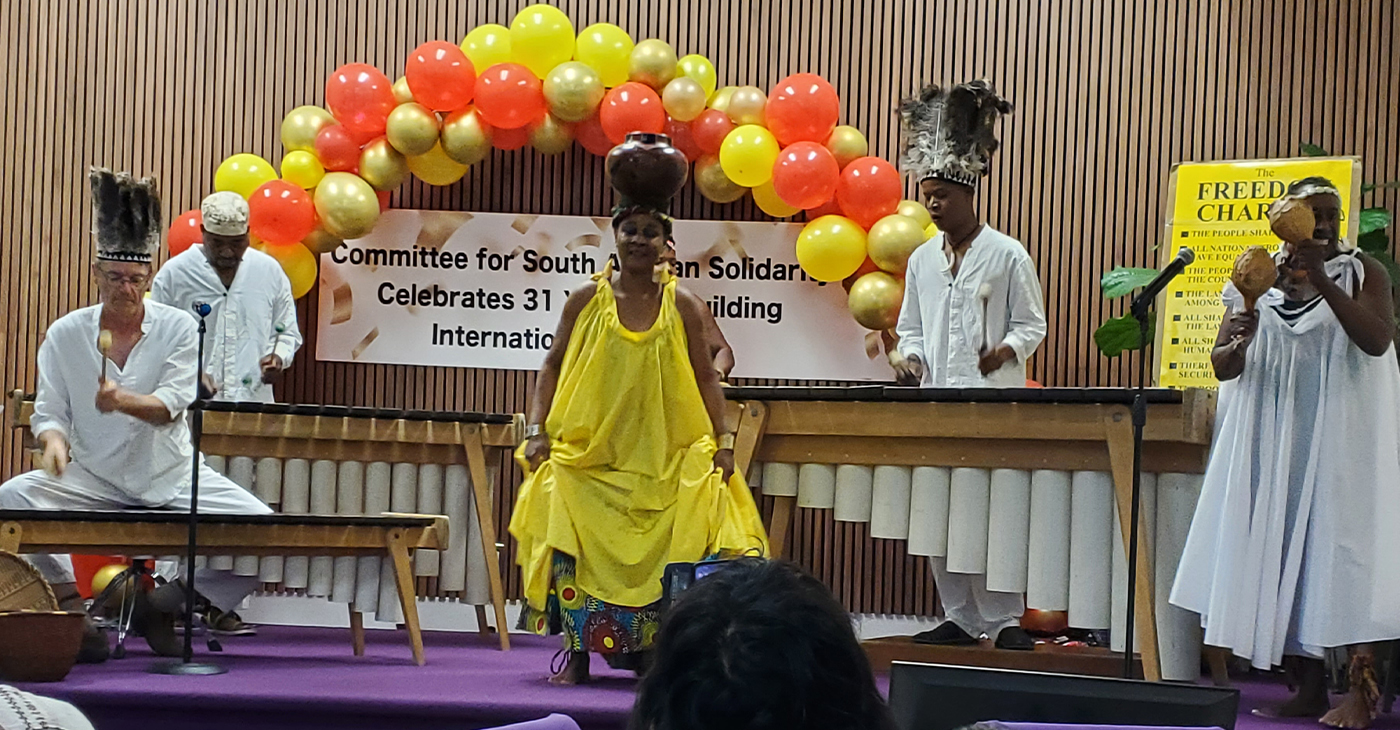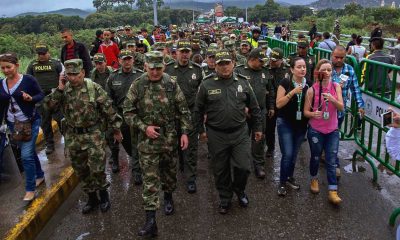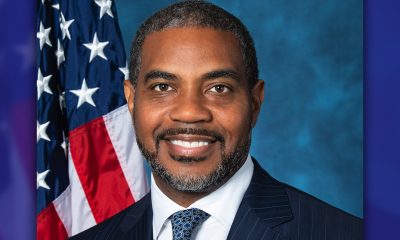World
Venezuelan 14 Year-Old Killed During Anti-Government Protest

Bolivarian National Guard soldiers advances on demonstrators attacking a police station during an anti-government protest in San Cristobal, Venezuela, Tuesday, Feb. 24, 2015. Demonstrators protest after a 14-year-old boy died Tuesday after being shot in the head during an anti-government protest in Venezuela’s restive western region. (AP Photo/STR)
LUZ DARY DEPABLOS, Associated Press
HANNAH DREIER, Associated Press
SAN CRISTOBAL, Venezuela (AP) — A 14-year-old boy died Tuesday after being shot in the head during an anti-government protest in Venezuela’s restive western region.
The student was injured during a confrontation between police and protesters in the city, and died on the way to the hospital, according to local human rights workers. Officials said 23-year-old police officer Javier Mora Ortiz confessed to firing on the boy with plastic ammunition.
A photo and video of the student lying in a pool of blood, his backpack hanging over his shoulder, as a man frantically tries to staunch the bleeding and others scream and clutch their heads in horror rocketed around social media.
Ruling party officials including President Nicolas Maduro condemned the killing with rare speed and forcefulness, and called for calm.
But what had started as a small demonstration against the socialist South American government grew into a larger protest as night fell in San Cristobal, with shops closing their doors and public transportation stopping routes in anticipation of unrest. Some schools in the university town near the Colombian border known for its tendency toward protests announced that the next day’s classes would be canceled.
One of Venezuela’s more radical opposition parties immediately called for a gathering in the capital Wednesday to demand an investigation into the cases of students who have died at the hands of the government.
Maduro said in a nationally televised address that masked protesters had used rocks to attack police who sought to quell the demonstration. He called on young people to resist instigating such confrontations, but also condemned the killing.
“I want to offer my condolences to the parents of this young man who was murdered in an act of violence,” he said.
Venezuelan ombudsman Tarek William Saab, a federal official charged with defending human rights, said on Twitter that he deplored the “vile assassination” of the teen, who he named as Kluiverth Roa, though other officials spelled his first name differently.
Last month, the government issued a policy change to allow law enforcement officials to open fire and use deadly force to control protests. At the time, human rights groups said the new regulation was dangerously vague, but Saab defended it.
Interior Relations Minister Carmen Melendez pledged that the government would pursue Roa’s killer “relentlessly.” And the attorney general’s office said the police officer would be charged in connection with the death.
Also on Tuesday, lawmakers from Venezuela’s ruling socialist party moved to strip an opposition congressman of his seat.
Lawmakers began the process of removing Julio Borges from the National Assembly. The Supreme Court must also approve the motion. Borges is one of a laundry list of high-profile opposition leaders recently accused of plotting to overthrow the government, and could be prosecuted if he loses his seat, and thus his legislative immunity.
Tensions were already running high in Venezuela following of a slew of bad economic news and the arrest last week of the opposition mayor of Caracas. February marks the one year anniversary of massive street protests that choked neighborhoods around Venezuela and left more than 40 people dead.
Dissatisfaction with the administration has grown in the past year, but opposition leaders have so far been reluctant to call for similarly large-scale protests.
In San Cristobal, residents vented their outrage Tuesday night.
“How are you going shoot point blank at a student who’s just leaving school to go home?” asked Glenda Lugo. “We’re tired of this injustice.”
___
Fabiola Sanchez contributed to this story from Caracas
Copyright 2015 The Associated Press. All rights reserved. This material may not be published, broadcast, rewritten or redistributed.
Activism
South African Solidarity Committee Hosts 31st Annual Celebration
“We’re all together for each other celebrating 31 years of building international solidarity between the people of the United States and South Africa toward the implementation of the 1955 Freedom Charter and 2030 Sustainable Development Goals,” said COSAS Operations Manager Nicole Richards.Located in Berkeley, COSAS is dedicated to the continuing struggle by the people of South Africa’s need for independence.

By Carla Thomas
The Committee of South African Solidarity (COSAS) celebrated its 31st anniversary on Saturday, Oct. 26 at the East Bay Church of Religious Science in Oakland.
Themed “Ubuntu,” a word in Zulu and Xhosa, which means “I am because we are,” the event brought together supporters and community members.
“We’re all together for each other celebrating 31 years of building international solidarity between the people of the United States and South Africa toward the implementation of the 1955 Freedom Charter and 2030 Sustainable Development Goals,” said COSAS Operations Manager Nicole Richards.
Located in Berkeley, COSAS is dedicated to the continuing struggle by the people of South Africa’s need for independence.
A soulful meal was prepared by Chef Rene Johnson and Blackberry Soul Catering along with live entertainment and speakers.
COSAS is an all-volunteer, private membership organization, made up of South Africans, Africans, students, professionals, clergy and others committed to building solidarity between the working people of the U.S. and the South African people still struggling for economic and political freedom.
Formed in 1993, the organization promotes the “real nature” of the changes and struggles taking place in South Africa and the African continent, according to Richards.
“COSAS counters ‘disinformation’ and ‘misinformation’ in the U.S. and Western mainstream media that creates division and distrust,” Richards said. “We produce the South African Beacon and organize and transport solidarity shipments of school supplies to South African grade schools requesting assistance,” Richards said.
According to organizers, COSAS is completely run by volunteers, free from the corporate and government agendas that continue to keep South Africa dependent on the West.
“We rely on the support of concerned individuals. Call us today about how you can get involved by sorting and packing supplies, donating office equipment, and supporting special events,” said Richards.
Earlier in the year, COSAS hosted its World Affairs film showing at Downs Memorial United Methodist Church. The screening featured a short film, “Feeding a Crisis: Africa’s Manufactured Hunger Pandemic,” exploring the hunger challenges African countries face and approaches to resolving the issues.
Contact the Committee for South African Solidarity, 1837 Alcatraz Ave., Berkeley, CA, 510-251-0998 for volunteer opportunities and event information.
Community
How Mobihealth Drives a Telemedicine Revolution in Africa
As a child growing up in northern Nigeria, Dr. Funmi Adewara experienced a severe hand injury that required multiple surgeries and frequent hospital visits. These visits exposed her to the harsh realities of the country’s healthcare system. “I remember sitting in overcrowded waiting rooms, watching doctors stretched thin, unable to meet the needs of so many patients,” Adewara recalls. This formative experience ignited her passion for transforming healthcare in Africa.

By Ifeanyi Abraham
CNN
As a child growing up in northern Nigeria, Dr. Funmi Adewara experienced a severe hand injury that required multiple surgeries and frequent hospital visits.
These visits exposed her to the harsh realities of the country’s healthcare system. “I remember sitting in overcrowded waiting rooms, watching doctors stretched thin, unable to meet the needs of so many patients,” Adewara recalls.
This formative experience ignited her passion for transforming healthcare in Africa.
Growing up with a mother who worked as a nurse, Adewara’s understanding of healthcare challenges deepened through her mother’s stories.
“I knew early on that healthcare wasn’t a privilege — it was a necessity, and I wanted to be part of changing the system,” she explains.
After training as a physician, Adewara worked for 15 years in the United Kingdom’s National Health Service before founding the telemedicine platform Mobihealth in 2017.
Since its launch, Mobihealth has impacted thousands of lives, connecting patients with doctors and healthcare professionals across Nigeria and beyond.
The platform has 20 integrated telehealth clinics that offer remote consultations, diagnostics, and access to specialist care via digital health tools. Located primarily in Nigeria, these clinics are accessible to patients through various subscription plans and are often financed through partnerships with global donor organizations and private donors.
In addition to the clinics, Mobihealth has partnerships with over 200 hospitals, labs, and pharmacies, Adewara says.
The company has earned global recognition, including a $1 million grant from the U.S. Trade and Development Agency in 2022. Adewara was also one of the World Bank’s seven 2020 Sustainable Development Goals & Her award winners, selected from over 2,400 entries worldwide.
Connecting Rural Patients
Across sub-Saharan Africa, millions struggle to access basic healthcare. According to the World Health Organization, the region bears 25% of the global disease burden but has only 3% of the world’s healthcare workers.
“In rural Africa, a trip to the nearest hospital can mean the difference between life and death,” says Adewara.
Mobihealth’s latest initiative offers healthcare for $1 a month for rural and underserved populations. It allows Africans in the diaspora — and global supporters — to sponsor essential services like doctor consultations, diagnostic tests, and access to telemedicine clinics.
The scheme is not solely based on donations; individuals can also subscribe to the service for themselves.
“Healthcare systems across Africa are under immense pressure,” Adewara explains. “Our initiative is a direct response, using technology to connect rural patients with doctors thousands of miles away.”
For Adewara, Mobihealth’s telemedicine platform is not a temporary fix; it represents the future of healthcare in Africa.
“This is about creating a resilient, sustainable and inclusive system, where people, no matter where they are, can access the care they need,” she says.
“Telemedicine brings doctors to people, wherever they may be. By integrating AI and remote monitoring, we are improving the speed and accuracy of care, saving lives in the process,” she adds.
A number of African companies provide telemedicine services, but researchers have pointed out that there are obstacles that could hinder the growth of telemedicine in the continent.
Rural areas can have an unreliable electricity supply and poor internet connectivity, and there is often a lack of government policies and funding around virtual healthcare.
“A Healthcare System for the Future”
Adewara envisions scaling her company’s model to reach millions more across Africa, particularly in countries like Ghana, Kenya, and Ivory Coast.
“Our work is just beginning,” she says. “We are building a healthcare system for the future — one that is resilient, inclusive and capable of meeting Africa’s growing population’s needs.”
However, partnerships are crucial to achieving this vision. “We can’t do this alone. Our collaborations with the African diaspora, hospitals, governments, and international organizations allow us to reach more people and ensure that healthcare is affordable, efficient and accessible,” Adewara adds.
Activism
Atty General Rob Bonta Joins Coalition Backing Pres. Biden’s Migrant Parole Program
“The Biden Administration’s CHNV Parole Program provides a safe pathway to apply for protection for Cuban, Haitian, Nicaraguan, or Venezuelan migrants fleeing violence and upheaval. We urge the court to uphold this program that creates orderly processes for people fleeing humanitarian crises to lawfully reach the United States,” said California Attorney General Rob Bonta. The federal government has exercised its authority under the Immigration and Nationality Act to parole migrants into the country for humanitarian purposes since the Eisenhower Administration.

By Bo Tefu, California Black Media
Attorney General Rob Bonta joined a multistate coalition of 18 attorneys general to write an amicus brief supporting President Joe Bidens’s Parole Program for migrants fleeing violence.
The multistate coalition will submit the brief to the Fifth Circuit Court of Appeals regarding the case Texas v. U.S. Department of Homeland Security. The brief endorses Biden’s Parole Program for Cubans, Haitians, Nicaraguans, and Venezuelans (CHNV Parole Program). The migrant parole program allows individuals from the four countries to apply for advance travel authorization. Migrants can be considered for temporary humanitarian parole of up to two years including employment authorization.
The coalition highlighted California’s interest in maintaining the federal government’s discretionary power granting migrants entry or allowing immigrants to stay on humanitarian grounds.
“In California, we believe that migrants escaping violence should be treated with compassion and dignity, and immigration parole programs are a crucial part of a just and secure immigration system,” said Bonta.
“The Biden Administration’s CHNV Parole Program provides a safe pathway to apply for protection for Cuban, Haitian, Nicaraguan, or Venezuelan migrants fleeing violence and upheaval. We urge the court to uphold this program that creates orderly processes for people fleeing humanitarian crises to lawfully reach the United States,” he said.
The federal government has exercised its authority under the Immigration and Nationality Act to parole migrants into the country for humanitarian purposes since the Eisenhower Administration.
The coalition argued that the lawsuit in Texas threatened to undermine the federal government’s authority to establish crucial programs that help migrants escape unstable circumstances in their home countries.
The coalition stated that parole provides safe, legal, and orderly pathways for people to seek protection in the United States.
However, opponents claim that parole pathways help increase crime and impose costs on states.
-

 Alameda County4 weeks ago
Alameda County4 weeks agoAlameda County District Attorney Pamela Price Announces $7.5 Million Settlement Agreement with Walmart
-

 Activism3 weeks ago
Activism3 weeks ago‘Jim Crow Was and Remains Real in Alameda County (and) It Is What We Are Challenging and Trying to Fix Every Day,’ Says D.A. Pamela Price
-

 Bay Area3 weeks ago
Bay Area3 weeks agoIn the City Attorney Race, Ryan Richardson Is Better for Oakland
-

 Activism3 weeks ago
Activism3 weeks agoOakland Post: Week of October 30 – November 5, 2024
-

 Alameda County3 weeks ago
Alameda County3 weeks agoD.A. Price Charges Coliseum Flea Market Vendors in Organized Retail Theft Case
-

 Activism3 weeks ago
Activism3 weeks ago‘Criminal Justice Reform Is the Signature Civil Rights Issue of Our Time,’ says D.A. Pamela Price
-

 Activism3 weeks ago
Activism3 weeks ago“Two things can be true at once.” An Afro-Latina Voter Weighs in on Identity and Politics
-

 Arts and Culture3 weeks ago
Arts and Culture3 weeks agoMacArthur Fellow Jericho Brown’s Poetry Reflects Contemporary Culture and Identity

























































